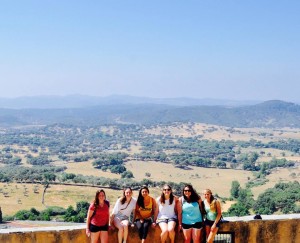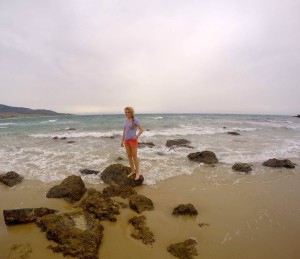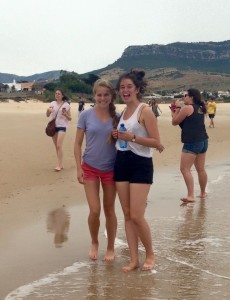Over the past couple of weeks, I have not only been able to enjoy Seville but see other parts of Spain as well! My study abroad program planned several trips over the past couple weekends including daytrips, overnight trips and weekend long trips. Between all the bus rides, planes and walking, I was able to see some beautiful parts of Spain.
Side note: I am having problems uploading photos from my camera so I only have a couple photos that my friends took and sent me. I am trying to solve the camera issue asap so I can share some of the great things I have seen and experienced!
Aracena
We did a daytrip to this little town called Aracena. It is located in the mountains, about an hour away from Seville. The first thing I noticed was that all the houses were white! They were all stucco and of very much the same design and I think it made the little town just charming. I t also caused me to wonder how do the houses stay so white? I guess because they don’t experience a change of seasons here. The white houses and buildings with the hot sun cast upon them just seemed to portay “Summer”.
We visited the church in Aracena and it was on a hill and therefore at the highest point of the town. It gave a breathtaking view of the little town and the surrounding countryside and mountains. It used to be a castle and then it was converted to a Catholic church ( similar to many things here in Spain that have changed or developed overtime due to Spain’s complex history involving the change of powers and religion). It was relatively small in size but the various details in the church made up for the size. It had beautiful arches, ceramic/tiled walls and a tall ceiling. It just amazes me how much detail is in one little church and that it is was probably all constructed, painted, and designed by hand. There were no machines or trucks or factories to produce the building materials or manufacture the tiles.
After visiting church we walked through the little town and stopped at a bakery. There are lots of bakeries in all the towns we visit and throughout Seville-and I just love it! At this particular “panaderia” I got a coconut macaroon and an mini apple pastry. The coconut macaroon was so delicious, one of the best that I have had. It was soft and on the inside and nicely toasted on the outside. We had lunch at Pena de Arias Montano which was a little park/lookout point located in the mountains close to Aracena. There was a nice breeze as we enjoyed our “bocadillo”. Bocadillos are the Spainsh name for sandwich or packed lunch.
Cadiz, Jerez, and Bolonia
Vamos a la playa! ( We are going to the beach)
This trip was on a weekend to the beaches of Cadiz and Bolonia as well as the famous little wine making town called Jerez.
Saturday we spent in Cadiz which is the oldest city in Western Europe, founded around 1100 b.C. ! We did a walking tour and saw the momument that commerated the constitution of Cadiz. Cadiz’s constitution called “la Pepa”, was the first Spanish constition ever drafted.There is an “old” and “new” part of Cadiz. The old part is the original city that was present many many years ago and parts of the original city walls still remain. The newer city is an expansion of the town that was necessary as the population grew. Cadiz is well know for its beach “playa de la Caleta”. We spent the rest of the afternoon relaxing. We also walked out on a very long pier/Jetty that led to an old castle. It gave a great view of the coast of Cadiz.
That night we drove to Jerez which is located midway between the sea and the mountains. It is most well known for the type of wine called Sherry. I don’t know much about wine so I had never heard of Sherry before. But I learned that the authentic Spanish Sherry is a chilled, very dry, white wine. Jerez is also really well known for horse breeding and there were several horse sculptures throughout the town. For dinner I ordered a couple of different “tapas” which are the Spanish version of appetizers but they are smaller and way cheaper than a typical appetizer in the U.S. I think my favorite tapa was marinated beef liver. It was my first time having beef liver and I thought it was very rich in flavor and delicious with the marinated flavors. It was served cold and I didn’t really like that but besides that, I enjoyed the dish ( I also had to avoid thinking about the fact that I was eating liver, beef liver).
That night in Jerez the town was full of activity because there was a procession for the Corpus Christi celebration and preparation for festivities the next day. This “Corpus Christi” celebration is a Catholic tradition that involves processions (which are like a parade) with special floats/monuments that are carried through the streets and accompanied by many people, music, and sometimes animals. Corpus Christi celebrates the body of Christ which is called the Eucharist for Catholics. I actually saw a couple processions while in Seville but for this particular one, it was considered a holiday for most people where there was no school, work, and most places were closed. So back to Jerez, they were preparing for the celebration of Corpus Christi by making murals on the streets. These murals were created with colored pieces of salt on the ground. It was similar to chalk art but with colored salt. I am not sure how it was organized but it appeared that families or groups of people were assigned a certain part of the street to create a salt mural. People of all ages were making the murals including young kids. It was fun to watch and then when we finished dinner, a lot of the murals were complete and we got to see the finished product!
The next morning we went to Bolonia which is a beach and home to the Roman Ruins of Baelo Claudia. There obviously isn’t much left, since its “ruins”, but it was interesting to see how the old city used to be set up and imagine what life was like hundreds of years ago. I liked the structural design of the city which included the planning that the temple was located at the highest point of the little city- as a symbol of their religion being the most important. Some highlights included the “salazones” and this is where they stored/preserved fish with salt or “sal” (they are basically big square holes in the ground but I had learned about them in my class so it was neat to see) . It was also interesting to see their bathrooms which were community bathrooms for the city. The showering or bathing rooms were kind of like big tubs that were heated by hot bricks below. That might be hard to visualize/ not make sense but to think that they had a way of creating hot water before electricity shows they were advanced and had technology for their time.
After the ruins visit we went down to the Playa de Bolonia. It was a nice beach with almost pure white sand (which turned out to not be our friend). It was a little cloudy/hazy but you could still make out the tip of Africa just across the ocean. Africa is really close to where we were in Spain (on the strait of gibraltar), I think only 20km across the ocean. There is a huge sand dune on the beach and I hiked that with my friends. From the top there was a gorgeous view of the beach, the skyline, and the surrounding hillside. But, it was sooo windy on the beach that day that the sand was pelting us and blowing everywhere. So that made it hard to really lay down on the beach and enjoy it, but it was still a beautiful sight to see and refreshing to be by the ocean.
A fun, little story about when I got home—there was so much sand in my bag from the windy Bolonia beach. I decided to shake it out over the ledge of my window in my room and I accidently dropped my bag below. Turns out my host mom didn’t have the key to the enclosed patio below so I was caught with no current solution, but I needed my bag for school and other things. So then I came across the idea to go fishing for my bag which was sitting two stories below. I devised a device with my belt, purse strap, fanny pack, hanger, and other things. It worked well enough because I actually retrieved my bag!
Location: Southern Spain




